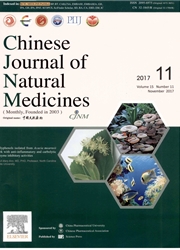

 中文摘要:
中文摘要:
The present study was designed to determine the intestinal bacterial metabolites of trollioside and isoquercetin and their antibacterial activities. A systematic in vitro biotransformation investigation on trollioside and isoquercetin, including metabolite identification, metabolic pathway deduction, and time course, was accomplished using a human intestinal bacterial model. The metabolites were analyzed and identified by HPLC and HPLC-MS. The antibacterial activities of trollioside, isoquercetin, and their metabolites were evaluated using the broth microdilution method with berberine as a positive control, and their potency was measured as minimal inhibitory concentration(MIC). Our results indicated that trollioside and isoquercetin were metabolized by human intestinal flora through O-deglycosylation, yielding aglycones proglobeflowery acid and quercetin, respectively The antibacterial activities of both metabolites were more potent than that of their parent compounds. In conclusion, trollioside and isoquercetin are totally and rapidly transformed by human intestinal bacteria in vitro and the transformation favors the improvement of the antibacterial activities of the parent compounds.
 英文摘要:
英文摘要:
The present study was designed to determine the intestinal bacterial metabolites of trollioside and isoquercetin and their antibacterial activities. A systematic in vitro biotransformation investigation on trollioside and isoquercetin, including metabolite identification, metabolic pathway deduction, and time course, was accomplished using a human intestinal bacterial model. The metabolites were analyzed and identified by HPLC and HPLC-MS. The antibacterial activities of trollioside, isoquercetin, and their metabolites were evaluated using the broth microdilution method with berberine as a positive control, and their potency was measured as minimal inhibitory concentration (MIC). Our results indicated that trollioside and isoquercetin were metabolized by human intestinal flora through O-deglycosylation, yielding aglycones proglobeflowery acid and quercetin, respectively The antibacterial activities of both metabolites were more potent than that of their parent compounds. In conclusion, trollioside and isoquercetin are totally and rapidly transformed by human intestinal bacteria in vitro and the transformation favors the improvement of the antibacterial activities of the parent compounds.
 同期刊论文项目
同期刊论文项目
 同项目期刊论文
同项目期刊论文
 期刊信息
期刊信息
